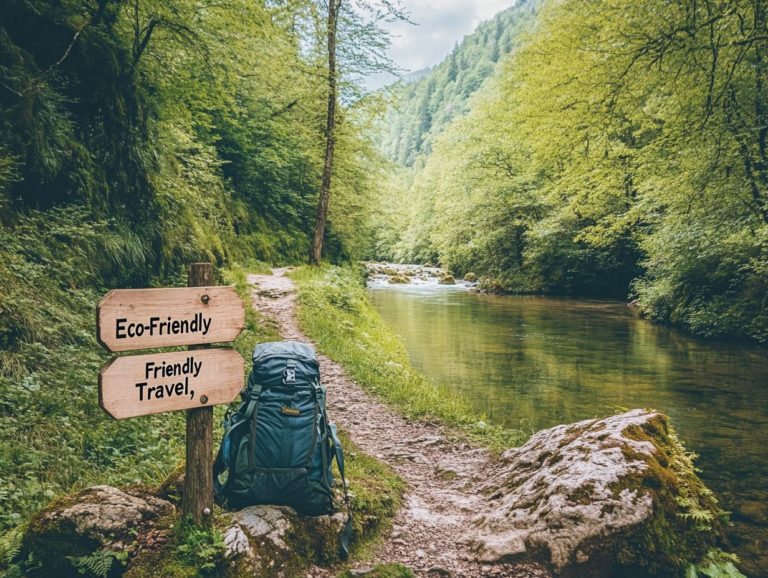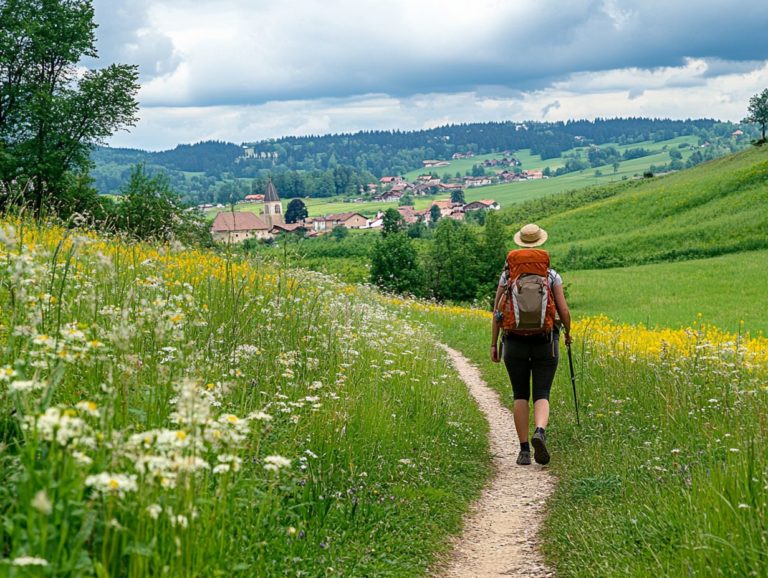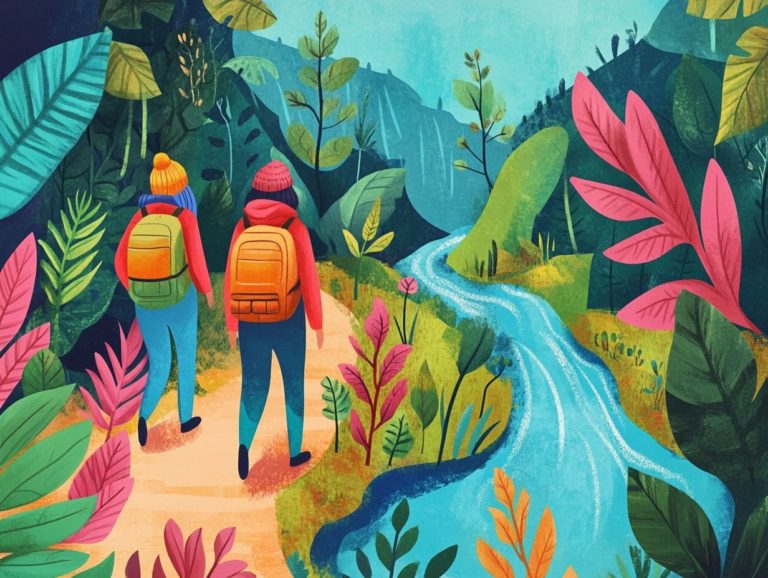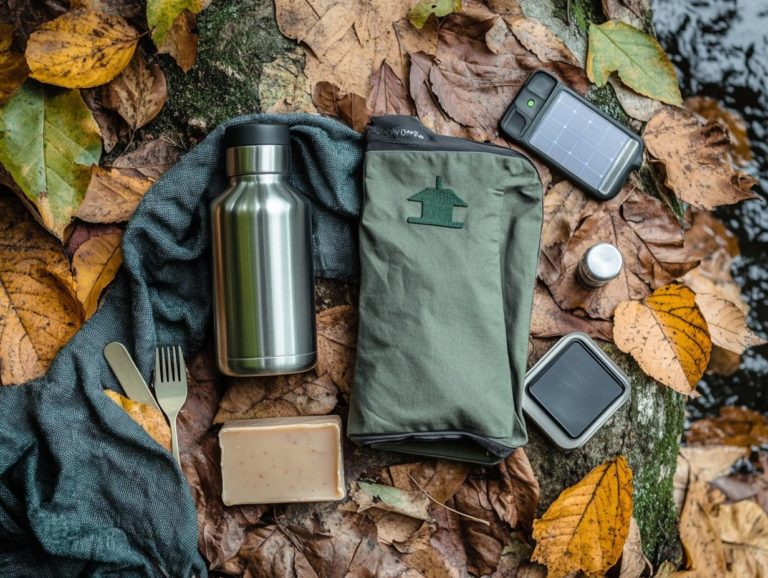How to Respect Wildlife While Traveling
Wildlife tourism offers a fantastic chance to connect with nature. It also comes with a responsibility to protect animal habitats.
This article explores why respecting wildlife is vital during your travels. You ll discover actionable steps to make your adventures both ethical and sustainable.
From choosing the right tour operators to packing thoughtfully, you’ll find tips that promote exploration and conservation.
Contents
- Key Takeaways:
- The Importance of Respecting Wildlife
- Ways to Respect Wildlife While Traveling
- Tips for Planning a Wildlife-Friendly Trip
- Frequently Asked Questions
- Why is it important to respect wildlife while traveling?
- How can I educate myself about the local wildlife before traveling?
- What are some ways to show respect to wildlife while traveling?
- What should I do if I encounter a wild animal while traveling?
- How can I support wildlife conservation efforts while traveling?
- What can I do to leave a positive impact on the environment and wildlife while traveling?
Key Takeaways:

- Respecting wildlife while traveling is crucial for the well-being of animals and their habitats.
- Be a responsible tourist by choosing ethical activities and supporting conservation efforts.
- Plan a wildlife-friendly trip by researching responsible tour operators, packing sustainably, and spreading awareness.
What is Wildlife Tourism?
Wildlife tourism means immersing yourself in nature by observing and interacting with animals in their natural environments. This type of travel offers unique experiences and supports wildlife protection and local economies.
When you engage in wildlife tourism, you embrace practices that contribute to essential conservation efforts. This way, both animal species and their habitats can thrive.
There are many options to explore, like nature-focused travel and wildlife safaris. Each presents distinct opportunities for unforgettable encounters with wildlife.
These adventures help cultivate a deeper appreciation for nature while generating funds for local conservation initiatives.
Practicing responsible tourism is essential. It keeps natural habitats intact and ensures communities benefit from visitor influx.
Ultimately, wildlife tourism connects people with nature while promoting a sense of responsibility for the planet. It’s a vital part of both recreation and conservation, inviting you to join a movement that cherishes and protects our world.
The Importance of Respecting Wildlife
Respecting wildlife is key to sustainable tourism. This ensures animals stay safe and habitats remain untouched, preventing habitat loss and the decline of endangered species.
By practicing responsible travel, you enjoy your experience while contributing to conservation programs that benefit local communities.
Why It Matters and the Impact of Irresponsible Tourism
The need for responsible tourism is crucial. Irresponsible practices can harm wildlife conservation, leading to habitat loss and increasing the vulnerability of endangered species.
Understanding tourism’s impact allows you to make choices that prioritize ethical practices. This ensures your decisions positively affect the environment and local communities.
A recent study reveals a troubling truth: nearly 70% of global wildlife populations have declined due to human activities, with tourism-related habitat destruction playing a significant role.
For example, building resorts in sensitive areas like coral reefs disrupts marine life and accelerates environmental damage. Increased foot traffic in fragile ecosystems results in soil erosion and water pollution, illustrating how careless tourism threatens biodiversity.
You can help by promoting sustainable practices and supporting conservation initiatives. These actions protect wildlife and mitigate the harmful effects of climate change.
Ways to Respect Wildlife While Traveling

You can embrace several strategies to respect wildlife while savoring your outdoor adventures. These strategies ensure a positive impact on both the environment and local communities.
Practicing responsible wildlife viewing minimizes your footprint. Immerse yourself in local culture to elevate your experience while supporting local communities.
Applying principles like Leave No Trace which means leaving nature as you found it keeps nature beautiful for everyone! This ensures that the environment remains pristine for future generations.
Responsible Wildlife Viewing and Interactions
Responsible wildlife viewing is about ethical practices prioritizing the safety and well-being of animals. Keep a respectful distance, avoid feeding or disturbing them, and choose activities that do not interfere with their natural behaviors.
By following these guidelines, you help ensure that wildlife remains unharassed and their habitats are preserved. Educate yourself about local regulations and avoid using flash photography, which can startle animals.
When near wildlife on roadways or trails, exercise caution. Maintain a safe distance and resist the urge to approach or touch them. Respecting these boundaries contributes to a healthier ecosystem while allowing you to enjoy nature’s beauty.
Supporting Ethical Conservation Efforts
Support ethical conservation efforts to promote sustainability in wildlife tourism. Collaborate with local communities and conservation organizations dedicated to preserving wildlife habitats. Your engagement in sustainable tourism helps ensure that local populations benefit from tourism revenues.
If you’re eager to make a positive impact, don t miss your chance to volunteer your time and expertise for on-the-ground projects focused on habitat restoration or species monitoring. Donating to local conservation initiatives provides essential resources for ongoing efforts.
Participating in community-focused activities, such as eco-tours led by locals or workshops celebrating cultural heritage, enhances your awareness. These activities directly benefit local communities.
By actively contributing to these endeavors, you enrich your travel experience and play a vital role in safeguarding ecosystems and supporting the livelihoods of those who rely on them.
Tips for Planning a Wildlife-Friendly Trip
Planning a wildlife-friendly trip requires thoughtful choices that enhance your travel experience and promote sustainable practices.
Opt for eco-friendly accommodations, use reusable items, and source seasonal, locally-produced food. These actions significantly reduce your environmental footprint.
Your journey can be a harmonious blend of adventure and responsibility, benefiting both wildlife and the communities you visit.
Join us in protecting wildlife on your next adventure!
Researching and Choosing Responsible Tour Operators

Researching and selecting responsible tour operators is a crucial step in ensuring your wildlife tourism experience aligns with sustainable tourism principles. Seek out operators that emphasize ethical practices and prioritize wildlife welfare.
Look for operators accredited by reputable organizations such as the Global Sustainable Tourism Council (GSTC) or the International Ecotourism Society (TIES). These certifications indicate a strong dedication to environmental stewardship and social responsibility.
Responsible operators engage in initiatives that protect natural habitats and promote wildlife conservation. They support community development, allowing positive interactions with local cultures. Be sure to check out reviews to see how others have enjoyed their experiences!
Act now to ensure your adventures contribute to ethical wildlife tourism, benefiting both the planet and its inhabitants.
Packing and Preparing for Sustainable Travel
Packing for sustainable travel means selecting eco-friendly items and reusable tools that minimize your impact on natural environments. This approach supports wildlife conservation and encourages others to travel responsibly.
When planning your journey, consider incorporating items that protect the planet, such as stainless steel water bottles and reusable tools. These reduce plastic waste. Use reusable cloth shopping bags and seasonally local food to avoid single-use plastics.
Innovative travel gear made from recycled materials supports wildlife conservation and lessens your environmental impact. By choosing biodegradable toiletries and eco-friendly lodging, you can enhance your contribution to a sustainable future.
Every small choice adds up. By embracing these eco-friendly options, you enrich your travel experience and play a vital role in preserving the beauty of our world and promoting wildlife protection and community support for generations to come.
The Importance of Spreading Awareness and Making a Positive Impact
Spreading awareness about wildlife conservation and responsible travel is essential for cultivating community support and positively impacting local ecosystems. By educating fellow travelers and sharing your experiences, you inspire others to adopt sustainable practices.
As a traveler, encourage respect for local traditions and understanding local culture. Minimize your environmental impact and consider following tips for sustainable wildlife tourism to contribute to conservation efforts. This sense of responsibility enriches your journeys and motivates communities to engage in conservation.
Whether through social media, blogs, or face-to-face conversations, sharing insights about responsible tourism creates opportunities for others to understand the significance of preserving nature and supporting local initiatives.
Ultimately, every story you share generates a ripple effect, fostering greater environmental awareness and strengthening the connection between travelers and the ecosystems they explore.
Frequently Asked Questions
Why is it important to respect wildlife while traveling?

Respecting wildlife helps protect natural habitats and supports responsible tourism. It maintains the balance of ecosystems and fosters sustainable tourism practices.
How can I educate myself about the local wildlife before traveling?
Research your destination to learn about local wildlife.
Connect with local farmers and read about the native flora and fauna.
Learn about any conservation efforts in place.
Consulting with a tour guide can provide more information.
What are some ways to show respect to wildlife while traveling?
Show respect to wildlife by staying on designated paths and practicing Leave No Trace, a set of guidelines to help preserve nature.
Keep a safe distance from animals and do not feed or touch them.
Properly dispose of trash to prevent pollution.
What should I do if I encounter a wild animal while traveling?
If you encounter a wild animal, remain calm and keep a safe distance.
Do not approach or touch the animal; give it space to move freely.
If the animal feels threatened, it may become aggressive.
How can I support wildlife conservation efforts while traveling?
Join the fight for wildlife conservation by choosing eco-friendly accommodations and tours that align with ethical practices, which prioritize the welfare of animals.
Avoid activities that harm or exploit animals and donate to reputable conservation organizations.
What can I do to leave a positive impact on the environment and wildlife while traveling?
Support local communities to enjoy the economic benefits they offer.
Reduce your carbon footprint by choosing public transport or biking instead of driving.
Avoid single-use plastics and participate in volunteer opportunities or clean-up efforts in the local community.






